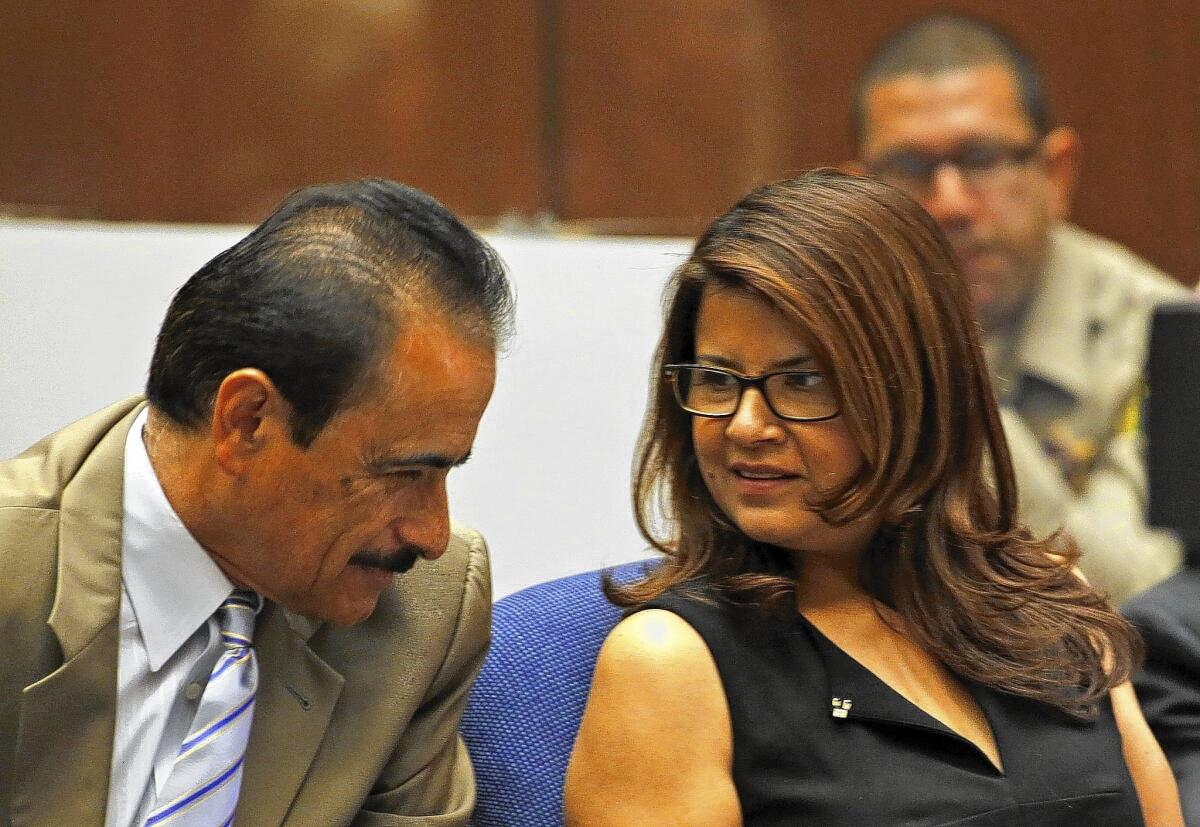Jury begins deliberating Alarcon perjury, voter fraud case

- Share via
After a nearly monthlong trial, the perjury and voter fraud case against former Los Angeles City Councilman Richard Alarcon and his wife headed to the jury Thursday.
The panel of seven women and five men will now determine whether Alarcon and his wife, Flora Montes de Oca Alarcon, are guilty of lying about where they lived from 2006 to 2009 so that he could qualify for office.
The couple have been accused of falsely claiming they lived in Panorama City so Alarcon could run in 2007 and 2009 to represent the council’s 7th District, which he did until last year. Prosecutors say Alarcon really lived outside the district in Sun Valley. The City Charter requires that candidates reside in the district they seek to represent.
Together, the Alarcons face more than 20 felony counts stemming from charges of lying about their residence in campaign, voter registration and Department of Motor Vehicles documents from 2006 to 2009. If convicted, Alarcon could face five years in state prison and his wife could face four years.
In her closing statement, Los Angeles County Deputy Dist. Atty. Michele Gilmer implored the jury to hold the couple accountable for “telling the same lie over and over again.”
State election law defines residence for voting purposes as a “domicile,” a home where one intends to remain and return after an absence. Because the law doesn’t lay out how much time a person must spend at a place for it to be his or her domicile, both sides focused closing arguments on the Alarcons’ intent to return to the Panorama City home.
“Domicile cases can be a really tough call because you’re trying to figure out someone’s state of mind,” said Jessica Levinson, who teaches election law at Loyola Law School.
Throughout the trial, the Alarcons’ attorneys have acknowledged that the couple did not spend every day from 2006 to 2009 at the Panorama City home. They say they were renovating the house and it remained their permanent residence because they planned to return once construction ended.
“You can be absent for a year, for two, for three, for four,” said Mark Overland, attorney for Montes de Oca Alarcon. “You intend to come back, that’s still your domicile.”
Defense attorneys said the prosecutor’s case is based on thinking the renovations took too long. They’ve called witnesses who testified to doing work on the house and another who said she saw Alarcon himself tiling a bathroom and putting up window blinds.
In his closing statement, Alarcon’s attorney Richard Lasting brought up Aza Zapasov, who testified the Alarcons came to her day-care center, next door to their Panorama City home, in June 2009 and asked about enrolling their young daughter. Lasting said they inquired because they planned to return to the Panorama City home.
Levinson said pieces of evidence like that, which suggest intent, could be enough for the defense to create “reasonable doubt” in the jurors’ minds. Before a jury can convict, the law requires it to agree the charges are true “beyond a reasonable doubt.”
“The prosecution basically builds a ship and the defense tries to poke enough of a hole to get some leakage,” she said.
Gilmer argued the Alarcons did not intend to return to the property. She reminded the jury that in 2007 the Alarcons obtained blueprints for constructing a proposed apartment complex on the Panorama City property. She also talked about former Councilwoman Wendy Greuel, who testified that Alarcon had once asked her to adjust the council district boundaries so the Sun Valley home — then in the 2nd District that Greuel represented — could be included in the 7th.
“It shows he had full knowledge of the law that he has to live in the district he represents,” Gilmer said. She said Alarcon wanted to work something out with Greuel so he could live with his then-fiancee in Sun Valley.
At this moment in Gilmer’s closing arguments, Alarcon — who had pushed his chair back so he could turn toward Gilmer and watch her address the jury — scrunched up his face and shook his head slightly. His wife stared straight ahead.
The Alarcons have attended the trial every day and sat next to each other, flanked on either side by their attorneys. During the two days of closing arguments, Andrea Alarcon, the former councilman’s daughter and herself a former city official, attended as well.
Gilmer said Wednesday that the prosecution’s evidence — including testimony from neighbors, utility company workers and district attorney investigators — overwhelmingly shows the Panorama City house was vacant.
Among the witnesses she called over 11 days of testimony were neighbors who said the house looked abandoned; a police officer who said that when a squatter moved into the home he was alone long enough to change the locks; and utility workers who said there was no gas used in the house between April 2007 and February 2009, without which the Alarcons couldn’t cook, heat their home or take hot showers.
Overland emphasized it didn’t matter if the Alarcons were never there in that period; the house remained their domicile because they planned to return.
“That to me shows a total misunderstanding of what this case is about, a total misunderstanding of the law,” Overland said.
soumya.karlamangla@latimes.com
Twitter: @skarlamangla
More to Read
Sign up for Essential California
The most important California stories and recommendations in your inbox every morning.
You may occasionally receive promotional content from the Los Angeles Times.














